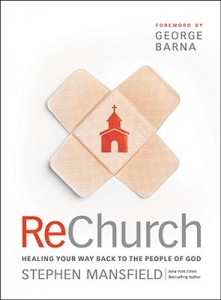ReChurch
Greg was as involved in the life of the church as anybody. He faithfully attended services. He served behind the scenes. He was involved in a small group. He even brought his friends and helped lead some to Christ. And then he was gone. Angry. Disappointed. Deeply hurt. And now Greg is the most ardent atheist I know.
It seems that our local churches are responsible for more hurt than healing. Whether that’s true or not, there are an awful lot of Gregs out there. Hurt. Bitter. Even to the point of unbelief. I’m sure we can all think of a Greg or two in our own lives.
Stephen Mansfield’s book ReChurch attempts to address those who have been burned by churches. With humor and common sense, he offers a tough love approach for people who have been victimized by a vindictive pastor, a controlling elder board, or a judgmental congregation. Though it may not be best-suited for folks like my friend Greg, who have taken their pain and turned it into a reason to not believe, ReChurch is an excellent book for those who are in the process of dealing with their church hurt.
 Mansfield’s approach is that of a coach rather than a counselor. He is primarily concerned with what you do now that you’ve been hurt. How do you move on from here? He gives practical advice for how to forgive those who have wounded you. He takes a common sense approach to learning the lessons of the experience and finding wholeness after. He’s tough. There is no coddling here. He doesn’t tell you it was all their fault and you’re blameless in the affair. He encourages you to look into your own heart and find your contribution to the mess.
Mansfield’s approach is that of a coach rather than a counselor. He is primarily concerned with what you do now that you’ve been hurt. How do you move on from here? He gives practical advice for how to forgive those who have wounded you. He takes a common sense approach to learning the lessons of the experience and finding wholeness after. He’s tough. There is no coddling here. He doesn’t tell you it was all their fault and you’re blameless in the affair. He encourages you to look into your own heart and find your contribution to the mess.
For the victims of church dysfunction, these words may be hard to hear. When we’re licking our wounds we want to be reassured that we’re perfectly innocent. It wasn’t our fault. We were just walking along, whistling a hymn and enjoying God’s creation, when we were blindsided by a pastor’s betrayal, harsh criticism from the elders, or rejection from a key church member.
But Mansfield won’t let you go there. The first question he tells you to ask as you begin your healing process is: “Of the things your critics said, what do you now know to be true?” (67) Sure your critics were mean. But were they right? Even just a little? ReChurch is full of difficult moments like this because Mansfield is convinced that our self-justification is keeping us from redemption and restoration.
This book is not what I thought it was going to be. I expected a book about how to deal with difficult people who happen to be pastors, how to navigate church conflict, or even how to survive the realization that your church (and the people in it) aren’t perfect. Thankfully, ReChurch is about none of those things, because none of that would help you to heal and eventually re-engage in church. What Stephen Mansfield gives us in ReChurch is a long look in the mirror at our own contributions to our church-related pain and a strong exhortation to forgive those who hurt us. This, he says, is the path to redemption and restoration.
Questions: Have you ever left a church because you were hurt, or known someone who has? Where are you with that pain, now? Do you think you were justified in leaving, or do you regret it? How do you counsel others dealing with church-related pain?

